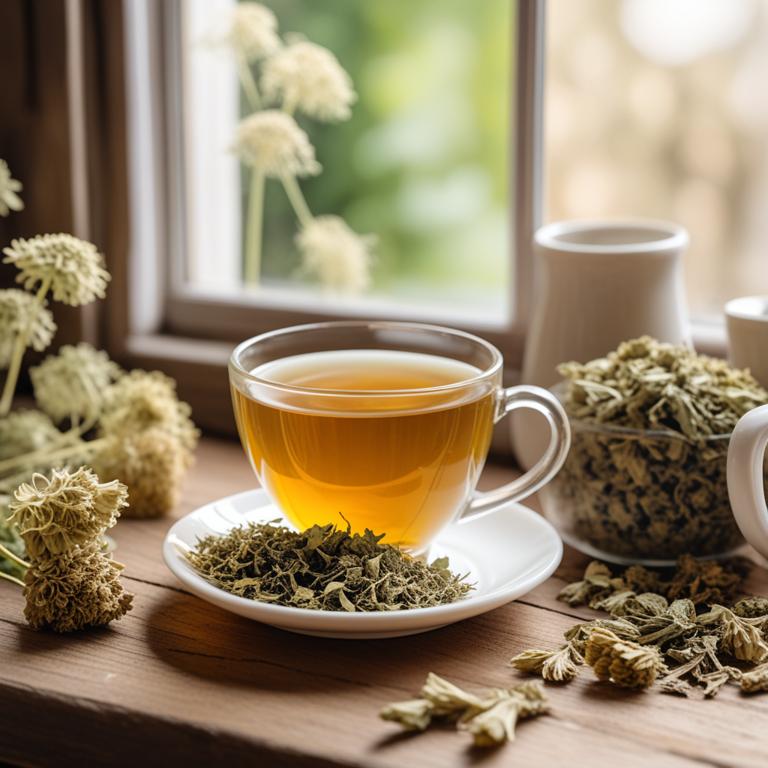8 Herbal Teas For Premenstrual Syndrome

Herbal teas can be a great way to help manage premenstrual syndrome (PMS) symptoms.
Zingiber officinale, or ginger, is a good example - it has anti-inflammatory properties that can help ease cramps and nausea. Valeriana officinalis, or valerian root, is another herb that can promote relaxation and reduce anxiety, which are common PMS symptoms. Avena sativa, or oat straw, can also help with anxiety and stress, and is known to improve mood.
These herbs work by interacting with the body's hormonal balance and nervous system. Ginger, for example, contains compounds that can help block pain pathways in the brain, while valerian root contains compounds that can promote a sense of calm and relaxation. Oat straw, on the other hand, contains a chemical that can help regulate serotonin levels, which can help improve mood.
Drinking herbal teas like these can be a natural and non-invasive way to manage PMS symptoms, and can be a welcome alternative to medication or other treatments.
- 1. Zingiber officinale
- 2. Valeriana officinalis
- 3. Avena sativa
- 4. Ginkgo biloba
- 5. Glycyrrhiza glabra
- 6. Paeonia lactiflora
- 7. Angelica archangelica
- 8. Lavandula angustifolia
1. Zingiber officinale

Zingiber officinale teas contains gingerols and shogaols, active constituents that help alleviate symptoms of premenstrual syndrome.
These compounds have anti-inflammatory and antioxidant properties that reduce pain and inflammation in the body. Shogaols, in particular, have been shown to inhibit prostaglandins, hormone-like substances that cause cramping and discomfort during PMS. The anti-nausea properties of gingerols also help reduce dizziness and lightheadedness often associated with PMS.
By consuming Zingiber officinale teas, women may experience relief from common PMS symptoms such as bloating, mood swings, and fatigue.
- Gather 1 cup of fresh ginger root, a tea infuser, and a saucepan.
- Wash the ginger root and peel it. Cut it into small pieces.
- In a saucepan, boil 2 cups of water. Add the ginger pieces to the water.
- Reduce the heat and let it simmer for 5-7 minutes. Strain the tea into a cup.
- Drink the tea 2-3 times a day, 2-3 days before your period. You can add honey to taste.
Zingiber Officinale Tea on Amazon
FGO Organic Ginger Tea, 100 Count, Eco-Conscious Tea Bags, Caffeine Free, Packaging May Vary (Pack of 1)
Disclaimer: We earn a commission if you click this link and make a purchase at no additional cost to you.
2. Valeriana officinalis

Valeriana officinalis teas contains valerenic acid, valeranone, and isovaleric acid as its bioactive constituents.
These compounds contribute to its sedative, anti-inflammatory, and antispasmodic properties. The sedative effect helps to calm the nervous system, reducing anxiety and stress that often accompany premenstrual syndrome. The anti-inflammatory properties of valerian root can help alleviate cramps and discomfort associated with PMS.
By reducing inflammation and promoting relaxation, valerian root tea can provide relief from symptoms of premenstrual syndrome.
- Gather 1 cup of boiling water and 1 tablespoon of dried Valeriana officinalis root.
- Measure 1 cup of boiling water into a tea infuser or a heat-resistant cup.
- Add 1 tablespoon of dried Valeriana officinalis root to the tea infuser or directly into the cup.
- Steep the mixture for 5-7 minutes, then remove the root or infuser.
- Strain the tea and drink it before or during premenstrual syndrome symptoms.
3. Avena sativa

Avena sativa teas contains a combination of active constituents like ferulic acid, avenacoside, and avenanthramides.
These compounds have anti-inflammatory and antioxidant properties, which can help reduce swelling and ease cramps associated with premenstrual syndrome. The ferulic acid in Avena sativa teas also has a relaxing effect on the body, which can help alleviate anxiety and stress that often accompany PMS. Additionally, avenanthramides have been shown to have a soothing effect on the uterus, which can help ease menstrual cramps and discomfort.
By consuming Avena sativa teas, women may experience relief from the physical and emotional symptoms associated with premenstrual syndrome.
- Gather 1 cup of dried Avena sativa (oat straw) and a tea infuser or a heat-resistant cup.
- Measure 1 tablespoon of dried Avena sativa and place it in the tea infuser or the heat-resistant cup.
- Pour 1 cup of boiling water over the Avena sativa. Let it steep for 5-7 minutes.
- Strain the liquid into a cup using the tea infuser or by pouring it through a fine-mesh sieve.
- Drink the tea 2-3 times a day, or as needed, to help alleviate premenstrual syndrome symptoms.
4. Ginkgo biloba

Ginkgo biloba teas contains bioactive constituents like flavonoids and terpenoids that have anti-inflammatory properties.
These compounds help to reduce the severity of symptoms associated with premenstrual syndrome, such as bloating and breast tenderness. The flavonoids in ginkgo biloba tea also have antioxidant properties, which can help to reduce oxidative stress and inflammation in the body. Additionally, the terpenoids in ginkgo biloba tea have been shown to have a positive effect on mood and reduce symptoms of anxiety and depression, which are common symptoms of premenstrual syndrome.
By reducing inflammation and promoting relaxation, ginkgo biloba tea may help to alleviate symptoms of premenstrual syndrome and improve overall well-being.
- Gather 1 cup of boiling water and 1 teaspoon of dried Ginkgo biloba leaves.
- Measure 1 teaspoon of dried Ginkgo biloba leaves and place them in a tea infuser or a heat-resistant cup.
- Pour the boiling water over the Ginkgo biloba leaves and let it steep for 5-7 minutes.
- Strain the tea into another cup and discard the leaves. Add honey or lemon to taste, if desired.
- Drink 1-2 cups of Ginkgo biloba tea per day, ideally 1-2 weeks before your period starts, to help alleviate symptoms of premenstrual syndrome.
5. Glycyrrhiza glabra

Glycyrrhiza glabra teas contains active constituents like glycyrrhizin, flavonoids, and saponins.
These compounds have anti-inflammatory and antioxidant properties that help reduce symptoms associated with premenstrual syndrome (PMS). Glycyrrhizin, in particular, is known to inhibit the enzyme 11-beta-hydroxysteroid dehydrogenase, which is involved in the regulation of cortisol levels. High cortisol levels can contribute to PMS symptoms such as bloating, mood swings, and fatigue.
By regulating cortisol levels and reducing inflammation, Glycyrrhiza glabra teas may help alleviate PMS symptoms, promoting a sense of calm and well-being.
- Gather 1 tablespoon of dried Glycyrrhiza glabra root and 1 cup of boiling water.
- Place the dried root in a tea infuser or a heat-resistant cup.
- Pour boiling water over the root and let it steep for 5-7 minutes.
- Strain the tea into another cup and discard the root.
- Drink 1 cup of the tea 2-3 times a day, preferably 1 week before your period starts.
6. Paeonia lactiflora

Paeonia lactiflora teas contains paeoniflorin and paeonol, which are bioactive constituents that have anti-inflammatory and antispasmodic properties.
These properties help to ease menstrual cramps and discomfort associated with premenstrual syndrome (PMS). Paeoniflorin also has a sedative effect, which can help to reduce anxiety and stress that often accompany PMS. Additionally, paeonol has antioxidant properties that can help to reduce oxidative stress and inflammation in the body.
By reducing inflammation and anxiety, Paeonia lactiflora teas may help to alleviate some of the symptoms of PMS, such as bloating, mood swings, and breast tenderness.
- Gather 1 cup of fresh Paeonia lactiflora flowers.
- Add 2 cups of water to a pot and bring to a boil.
- Reduce heat and add the Paeonia lactiflora flowers. Let it steep for 5-7 minutes.
- Strain the mixture into a cup and discard the flowers. Add honey to taste.
- Drink 1/2 cup of the tea 2-3 times a day as needed for premenstrual syndrome symptoms.
7. Angelica archangelica

Angelica archangelica teas contains bioactive constituents such as angelic acid, isoangelicin, and ferulic acid, which have anti-inflammatory properties.
These compounds help to reduce swelling and pain associated with premenstrual syndrome (PMS). The anti-inflammatory properties of angelic acid and isoangelicin also help to alleviate menstrual cramps and discomfort. Additionally, ferulic acid has antioxidant properties, which help to protect the body from free radicals and reduce oxidative stress that can contribute to PMS symptoms.
By reducing inflammation and oxidative stress, angelica archangelica teas may help to alleviate symptoms of PMS, such as mood swings, breast tenderness, and fatigue.
- Gather 2 tablespoons of dried Angelica archangelica root. You can buy it at a health food store or online.
- Place the dried root in a cup of boiling water. Let it steep for 5-7 minutes.
- Strain the tea into another cup. Discard the root.
- Add honey to taste, if needed. Some people find it helps with the bitter taste.
- Drink the tea 2-3 times a day, when you feel symptoms of premenstrual syndrome. You can also drink it before bedtime to help you relax.
8. Lavandula angustifolia

Lavandula angustifolia teas contains a unique combination of bioactive constituents, including linalool and linalyl acetate, which give it its therapeutic properties.
These compounds have a calming effect on the body, reducing stress and anxiety, two common symptoms of premenstrual syndrome (PMS). The tea also contains apigenin, a flavonoid that acts as a natural sedative, helping to regulate mood swings and emotional instability associated with PMS. Additionally, the tea's high antioxidant content helps to reduce inflammation, which can contribute to physical discomfort and breast tenderness during PMS.
By consuming Lavandula angustifolia tea, individuals may experience relief from PMS symptoms, promoting a sense of well-being and balance.
- Gather 1 cup of fresh Lavandula angustifolia leaves or 1 teaspoon of dried leaves.
- Heat 1 cup of water in a saucepan over low heat.
- Add the Lavandula angustifolia leaves to the water and let it steep for 5-7 minutes.
- Strain the tea into a cup and discard the leaves.
- Drink 1 cup of the tea 2-3 times a day to help alleviate premenstrual syndrome symptoms.